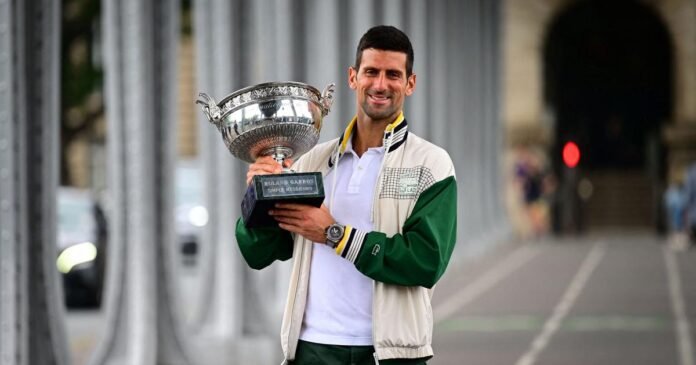Novak Djokovic, one of the most successful tennis players in history, recently opened up about the importance of mental strength in his game. In an interview with Vala Afshar, Djokovic emphasized that mental toughness is not an innate gift but the result of dedicated effort and practice. He shared that, while he may appear calm and composed on the outside, there’s often a storm of emotions raging within. For Djokovic, the real battle is internal, and mastering this inner struggle is key to his success on the court.
When asked how he trains his mind to achieve such discipline and focus, Djokovic explained that it requires consistent work. Mental strength, according to him, is developed over time through deliberate practices that help regulate emotions and maintain concentration, especially during high-pressure situations. Djokovic dismissed the idea that his mental fortitude is simply a natural talent, instead highlighting the years of effort he has invested in strengthening his mind.
Djokovic revealed that one of the techniques he relies on to stay mentally strong is conscious breathing. This method involves focusing on each breath, particularly during moments of tension, to calm the mind and body. By paying attention to his breathing, Djokovic can center himself, reduce anxiety, and maintain a clear focus on the task at hand. This technique is not only useful in sports but also in everyday life, where stress and pressure can easily overwhelm a person.
Another technique that Djokovic uses is visualization. He spoke about how he mentally rehearses his matches before they even begin. By visualizing himself successfully executing shots and strategies, Djokovic prepares his mind for the actual competition. This practice allows him to anticipate challenges and reinforce his confidence, making it easier to handle the unpredictable nature of live matches. Visualization helps Djokovic create a mental blueprint for success, giving him a psychological edge over his opponents.
Djokovic’s approach to mental training extends beyond these techniques. He emphasized the importance of self-awareness and the willingness to confront one’s weaknesses. Djokovic believes that understanding one’s emotional triggers and learning to manage them is crucial for personal growth. He regularly reflects on his performances, both on and off the court, to identify areas where he can improve. This self-reflection is a vital part of his mental conditioning, enabling him to learn from mistakes and continuously evolve as an athlete.
The tennis star also discussed the role of meditation in his routine. Djokovic practices meditation to quiet his mind and achieve a state of inner peace. This practice helps him stay grounded, especially when faced with the intense demands of professional sports. Meditation allows Djokovic to disconnect from external pressures and focus on his inner world, which in turn enhances his mental clarity and resilience. For Djokovic, meditation is not just a tool for relaxation but a fundamental aspect of his mental training regimen.
Djokovic’s mental strength is evident in his ability to perform consistently at the highest levels of tennis. His success is not merely a result of physical prowess but also of the mental discipline he has cultivated over the years. Djokovic’s dedication to mental training has played a significant role in his numerous victories, including his record-breaking Grand Slam titles.
Djokovic also highlighted the importance of routine in building mental strength. He believes that having a consistent routine, both on and off the court, helps him maintain focus and reduce anxiety. This routine includes specific rituals before and during matches, such as his habit of bouncing the ball several times before serving. These rituals are not just about physical preparation; they serve as mental anchors that help Djokovic stay centered and calm, even in the most intense moments.
Another aspect of Djokovic’s mental approach is his ability to stay present. He mentioned the importance of living in the moment and not letting the mind wander to past mistakes or future outcomes. By focusing on the present point, Djokovic is able to give his full attention to each shot, minimizing distractions and enhancing his performance. This mindfulness is a skill that he has honed over time, and it plays a crucial role in his ability to remain composed during high-stakes matches.
Djokovic also credits his mental strength to his support system. He acknowledges the role of his coaches, family, and friends in helping him stay grounded and motivated. Their encouragement and constructive feedback have been invaluable in his journey to becoming a top athlete. Djokovic emphasized that surrounding oneself with positive influences is essential for maintaining mental health and resilience, especially in the face of challenges.
Finally, Djokovic’s mental approach includes a strong sense of purpose. He often reflects on his goals and the reasons behind his dedication to tennis. This sense of purpose fuels his motivation and keeps him focused on his long-term aspirations, even when faced with setbacks. Djokovic believes that having a clear purpose is vital for sustaining mental strength over the course of a demanding career.

